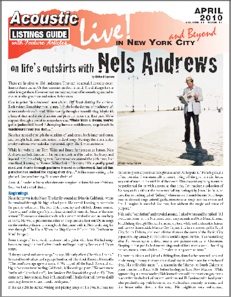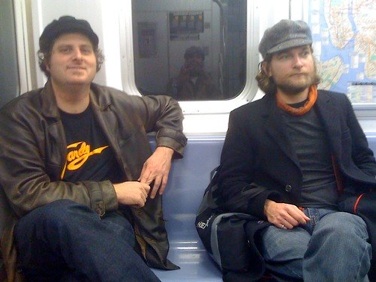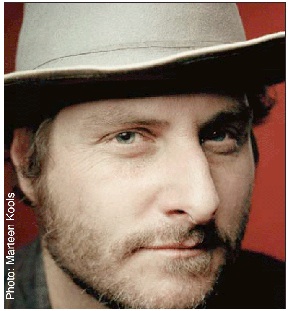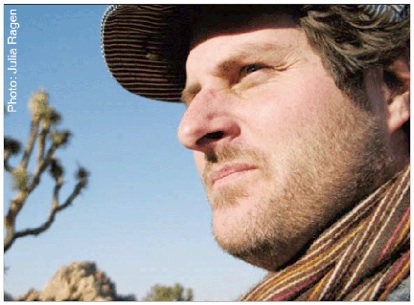on life’s outskirts with
Nels Andrews
by Richard Cuccaro
There are far edges to life’s landscapes. They can be actual, like rocky coastlines or desert dunes. Or they can exist inside of a mind. The challenge for the artist is to get there. However they are reached, they offer something exalted to the artist who gets there and mines their secrets.
Case in point: Nels Andrews’ latest album, Off Track Betting. Bells chime. Birds twitter. Something metal clangs. It might be the detritus of machinery left to rust on the side of a road. We’re peering through a dreamlike fog. Maybe it’s a haze of dust as the late afternoon sun picks up motes that float past. We’ve stepped through a portal to somewhere else.
“Wake from a dream, you’ve got a jackrabbit heart
Jumping horses midstream, sagebrush to washboard road you dart…”
Nels has traveled through the outskirts of landscapes, both inner and outer, and brought back cinematic stories inside of songs. He sings them in a husky, smoky baritone over melodies that sound, aptly, like film soundtracks.
While his website lists Tom Waits and Bruce Springsteen as heroes, Nels
Andrews has Jack Kerouac in his veins as surely as if he tied off his bicep, and injected him into a bulging vein. For somewhere around the 50th time, I sit transfixed, listening to “Rented White Sedan.” It starts, “It’s a pretty good road, and it cuts through pastures framed in cottonwood. And all this paradise has sucked the raging river dry…” A film outro waiting to be plucked. Are you listening, Sundance disciples?
As usual, I needed to know what elements conspired to form this seer of visions. So… we had a small chat…
Beginnings
Nels’s father was in the Navy. The family wound up living in California, where he remained through his high school years. He started listening to records in his parents’ collection. The Bob Dylan, country and old folk albums seemed “pretty square” at the age of 15, but later, around 21 years old, became “the awesomest.” There was a piano in the church his mom worked at and an autoharp at home. He would pick out melodies on the piano and beat out Dylan songs on the autoharp thanks to a songbook that came with it. Nels could sing his way through “The Hour When the Ship Comes In” and “Mr. Tambourine Man” by age 5.
From the age of 14 onward, he always had a guitar with him. He had songbooks and taught himself a few chords and began playing Beatles and Dylan songs.
“I always played and wrote songs,” he says. His early efforts (“horrible, I think,” he stated) revolved around a garage band called The Black Blasters. He recalls: “The band’s average age was about 8. We ripped off the Beach Boys and our big hit’s chorus went ‘surfing California, is like eating a plum.’ We were more ‘surfin safari’ (the bad stuff), less Smile or Pet Sounds (the good stuff). Then came some long-winded, beat-influenced stuff. I hadn’t learned how to distill anything down to where it could be digested.”
In his early 20s he started writing and playing songs on his own, but was too restless to give it any serious thought as a career. As he puts it, “ For a big chunk of my twenties, I was essentially a hermit, living off the grid in a dirt house way out of town in the middle of the desert. Music wasn’t anything meant to be performed for or with anyone at that time. I’m reading a collection of Norwegian folk tales at the moment (half my heritage) by Jonas Lie. In it, he describes something called “jojking” where an old Finnish hermit (who keeps bees in his coat) sings unintelligable, monotonous songs into the smoke and fire. I imagine it sounded like that, but without the magic and sense of purpose.”
Nels had a “wanderlust” and traveled around. I asked where and he replied: “All over... sea towns on the Northwest coast, canyonlands and First Mesa, Arizona. Hitchhiking through Mexico, I shacked up for a while with a chocolate heiress and her two lions outside Mexico City. I spent time in a one-room jail in Rapid City, South Dakota, and soon afterward made the cover of the Rapid City paper, strolling casually in front of the world’s largest burrito. This wasn’t long after I’d woken up in a ditch near a cow pasture outside of Cheyenne.
Sleeping in that puddle had me walking crooked for almost a year… boarding houses, motels, tents, ditches… It makes touring seem so tame.”
He went to Alaska and joined a fishing fleet, found other seasonal jobs and made enough money to move around and stay in a few places for stretches of time. His online bio states: “…a season in the fisheries, to South Dakota to plant trees in the Black Hills, before landing in Taos, New Mexico. While
apprenticing as a woodworker, Nels learned how cold the desert can get, drank black velvet in the back of custom lowriders and El Caminos with local youth who poached sheep with bowie knives. He lived alone mostly, in a mud and tire house miles down a fire road. His neighbors were well-armed,
amphetamine-fueled misfits who kept their dogs on long chains, and the grown children of elder hippies, whose gurus had all left town years ago. Nels befriended them all, especially the small town drunks and prophets, who colored his worldview. He took notes, and hummed melodies, sat shyly with his guitar at campfires.”
The Career Begins
Nels moved to Taos, New Mexico when he was 18 and later settled primarily in Albuquerque. Most of his adult life has been spent there. He’d travel around, return to California to visit his parents, but use New Mexico as a home base. It was in Albuquerque that he started writing in earnest and playing gigs. “There were these punk rock stages. There’d be a metal band, a punk band and…folk singing,” he said, laughing. He was playing mostly rock ‘n’ roll and had formed a band. The places he was playing in resulted in it being more of a “bar fight” between him and the audience rather than any kind of “Kumbaya moment,” he says
Nels began writing and recording and made an album, Sunday Shoes, with friends. He learned about the Kerrville Folk Festival in Kerrville, Texas, and about its “New Folk” award. He attended the festival, tapping into the folk/singer/songwriter community. In 2002, he became a Kerrville New Folk winner.
Because I had been introduced to Nels’ music by way of the more recent, lushly mixed Off-Track Betting, it took a while to appreciate the spare, leaner sound of Sunday Shoes. Make no mistake — the writing on Sunday Shoes is as brilliant as its successor, albeit without the fuller sonic realization of mood. In “Broken Conversation,” the guitar, banjo and mandolin get it done just fine. Speaking to a telemarketer, the broken-hearted protagonist tells the voice on the other end of the line,
“She don’t live here no more, stop what you’re sellin’.
She don’t live here no more, don’t make me blue.
Well, I’d swim that black ocean, to be there by mornin’.
I’d sing ‘God Save the Queen’ in my coat and my cap.”
Yes I’ve been drinkin’ to aid my forgettin’.
You’d best be goin’, ‘fore I read you my mind…”
There are some deft atmospheric touches in “Lilli Marlene.” A muted trumpet adds a counterpoint to the banjo as a backdrop to a dark tale.
“… in a quiet corner, he pushed her up against the chair.
He couldn’t have her if he wanted her.
She offered him a velvet stare…”
The lap steel in “Petal to a Bee” adds a roadhouse feel for this listener.
“All the rollin’ hills of evergreen pull me like a petal to a bee.
Long women in short dresses swayin’ in the summer wind.
Everything is still but the leaves. I can hear home callin’ me…”
The album concludes with “Big Oaks Sway,” a brilliant piece of poetry using only guitar and banjo.
“There’s perfume and powder in the juniper wind.
I’m so far from home and lord I have sinned.
I jimmied the lock on a crossroads door
and spent two week’s wages on a Winslow whore…
And I pulled out the thorns of a sunrise crown,
for I’d slept in the caves on the outskirts of town.
It’s one time for solitude and twice for shame
and I am burnin’ like fire wearin’ my grandfather’s name.
When the big oaks sway, let the wind blow
and the rain walk the boards on my front porch floor.
I am just a leaf in the wind and I can do no more.”
I am, at long last, captivated.
Road Tales
Nels toured the Southwest, not venturing out of that area, at first. For the first time, he and his band were playing fancier concert halls, in addition to the smaller clubs and bars. He sent Sunday Shoes overseas and received plaudits in England and Europe. Nels found both work and a following in Europe, playing clubs and festivals. Out of these journeys, adding to his global vision, came some amusing stories…
In Holland, in a multi-tiered Dutch theater, he and his accompanist ran into Reggae star Eek-a-Mouse, with posse, on an elevator: “We stepped on with our instruments still strapped to our backs, and the doors closed to the cool reception of a dozen red eyed rastas in suits. The ice was broken by Mr. Mouse himself who said, “Hey white boy, play something on ‘dat banjo.’ Jeffrey Richards, my musical co-conspirator, was coincidentally working on an original dub project at the time called ‘Fine Young Cannabis,’ and was quick to swing his banjo into position and launch into a skank rhythm (riddem?). Mr. Mouse was needless to say bemused and started clapping along. Not wanting to break rank, the rest of the elevator joined in with crooked smiles on their faces as bandmember ‘Lucky’ jumped into a soulful, dancehall version of ‘Jimmy Cracked Corn and I Don’t Care’. The doors opened to our dressing floor and we heard the clapping continue on up to their soundcheck on the next floor.”
In another case, a Holland “misadventure,” occurred while sharing a backstage with the iconic prog-rock band Yes. Said backstage was teeming with “film crews, aging groupies, and rock urchins, mining the dressing rooms for free beer and deli trays.” An envelope with thousands of dollars of post-festival pay belonging to Nels and band disappeared. The following week, they played a set for the Dutch Chief of Police’s retirement party at an 18th century bar. He recalls, “They heard about our plight, and we found a good share of what was lost in the hat at the end of the night. Love the Dutch.”
In the UK, his Scottish road manager, Rob, “refused to look at maps, or plan ahead things like how long it will take to get to the next gig. His idea being you get to the center of whatever town you’re booked to play, and ask directions. This led to many an evening long on adventure, and short on efficiency. One time in Wales, running late already, Rob decided to ask for directions from a fellow standing at a bus stop. As he was telling us the lay of the land, leaning in through the open back window, we didn’t notice that he had put his bag of beers on the floor of the car, and had opened the door. Says our new friend Wynn, ‘I’ll not tell ya, but I’ll show ya!’ how to get to the gig. Short bursts of ‘Left here!’, ‘Right at the church!’, were staggered with tales of his early career as a heavy metal drummer ‘played the double bass drum!’ As the street lights faded into moss, heather and country roads, it became apparent that Wynn was not leading us to the gig, but in fact, his own house. We pulled the car over, and our tour manager demanded directions to the gig, only to be met with crossed arms, and ‘I’ll not do it!’ After a brief shouting match, Wynn was soon escorted from the car. ‘Aye, its good to have a gig,’ our man from the highlands said, as we sped back towards town.
Indeed.”
In the U.S., Nels was playing at South by Southwest in 2006 and as he tells it, “AJ Roach and I were participating in our booking agent’s yearly fundraiser at a local soup kitchen, wherein we all play for the (our fellow) hobos. It’s a twenty hour drive from New Mexico to Texas, and we’d pulled in
really late at night, found our way to a buddy’s house where we’d been offered some floor to sleep on. When we got there we found out that the house was in the middle of major reconstruction (e.g. no real floor or walls), so there was carpentry all over, things in massive disarray, etc. Of course, we ended up playing music ‘til dawn with a bunch of friends nonetheless. Whiskey was likely involved. And of course, come morning, we realized almost too late that we needed to get to the soup kitchen gig. So we rushed over there, found the standard pre-lunch line snaking around the corner, and ran to the front door, guitars strapped to our backs and fluffy insulation in our hair from the house. Upon our request to get inside we were told by the gentleman guarding the door, ‘Back of the line buddy, just like everyone else.’ It was at this point that a surreal line was crossed between the romanticized hobo that I identify with, and real hobos, who were in front of me in line, hungry for a meal.”
Nels and AJ Roach on NYC subway
Moving East… into the Present
Nels moved to New York in 2006. He melted into the Brooklyn/East Village singer/songwriter community, playing in the small clubs dotting the cityscape of those locales. Later, he branched out, touring the East coast. An Off-Track Betting parlor below his apartment in Brooklyn gave him the title of his most recent album, released in 2008. The betting parlor probably gave him some dialog as well. In “Dollar and the Dream,” he sings, “Easy money knows where to find me… the space between the dollar and the dream’s gonna be the end of me.”
One of the best things to ever happen to Nels was getting Todd Sickafoose, bassist for Ani DiFranco, and a producer/collaborator for a slew of other artists, to produce Off Track Betting. While Todd’s solo work leans heavily toward jazz, he and Nels found just the right effects for Nels’ poetic landscape-like visions.
While some might think that the tenements of the city transformed his style on Off-Track Betting, I still hear the desert and the vast spaces that he’s traveled through in every song. They live there in his voice, in his chest, in his word-
pictures. In an interview conducted with Long Island’s AcousticMusicScene.com in June, 2009, he states, “Our goal was to capture the clinks and clanks of the city, but still keep a bit of the open space of the western landscape. Imagine the city, but from a rooftop. I think it’s a warmer, more optimistic record.
He might be referring, in part, to “Butterfly Wing,” in which he sings: “She’s as pretty as a butterfly’s wing… I’m as happy as a dog in the yard… I’m as happy as that…” It just now occurs to me to ask him if he’s referring to the deceptiveness of the snare of love. No matter. The electronic birds twitter and the sun bleeds everywhere through the track. This listener is as happy as a dog lying on a warm patch of ground.
My favorite track on Off Track Betting keeps changing. Right now, I can’t stop listening to “Three Days.” The protagonist in the song has lost his love. It’s only 3 days in and his world is falling apart. The distortion-boosted electric slide guitar in the background intones doomsday like a gong.
The mood is established immediately: “I went walking in the warm rain… I went walking in the warm rain… Drained the bottle in a porch swing… I went walking in the warm rain…” and doesn’t let up: “Woke up next day feelin' like hell… I pinned a pigeon in the wheel well” and adds layers of poetic imagery: “And I slept all day and I drove all night / Cat-eyed moon in the dashboard light / Ash on the floorboard, bloodshot eye / You're not the only one running wild…” At the end, there’s no doubt that this guy is in big trouble: “And it's only been three days… My bed is empty, my bed's unmade… Oh, girl, come back home.”
The album is addicting. One night, while delivering Acoustic Live to venues around lower Manhattan, I plugged the iPod into the car stereo and listened to it continuously. Near the end of my run, I stopped at Banjo Jim’s in the East Village. There was Nels, packing up after his set that evening. I said, “Nels, I’ve been listening to Off Track Betting all night! He seemed gratified at my enthusiasm and offered a sincere thanks in response. My respect for him kept growing and here we are, finally putting it in print (and pixels).
A Favorite Book
My insistence in referring to the vistas conjured by his music jogged a memory for Nels. He recalled that, “My favorite book as a kid was Frederick the Mouse by Leo Leonni, which tells the story of a mouse who spends the fall harvesting stories and colors, instead of nuts and berries, much to the chagrin of his fellow mice, until the greyest point of winter when Frederick digs deep into his bag and pulls out the blues and greens of summer in story and poem, and his fellow mice were transported. I’m pretty sure this book ruined any chances I had at gainful employment.”
We at Acoustic Live are joining the ranks of those who believe that Nels has great things ahead of him. Hang in there, Nels. “Gainful employment” is coming… in spades!
Website: www.nelsandrews.com
Upcoming gigs include:
Apr 2 8pm Me & Thee Coffeehouse w/ Peter Mulvey
Marblehead, MA
30 8pm Uncle Calvin’s Coffee House - Dallas, Texas
Jun 11 8pm Kerrville Folk Festival - Kerrville, Texas
12 8pm Wyldwood Shows - Austin, Texas
21 8pm Union Hall - Brooklyn Songwriters Exchange w/ Dare Dukes
Brooklyn, NY
Jul 30 Southern Fried Festival Perth Theater, Perth, Scotland
Aug 7 Tartan Heart Belladrum Festival, Inverness, Scotland





